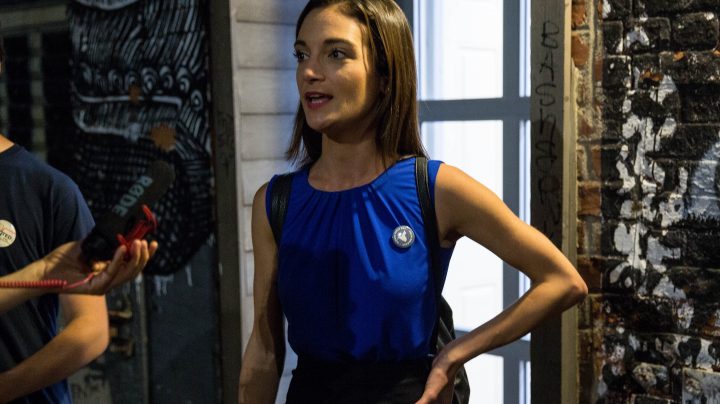Democratic Socialist Julia Salazar Is Reelected as Senator in Brooklyn

Insurgent Democratic Socialist candidate Julia Salazar addresses the media after defeating incumbent Democrat State Senator Marty Dilan on September 13, 2018 in New York City. Photo by Scott Heins/Getty Images
Democratic Socialist Julia Salazar, 29, gained national attention when the first-time candidate became the New York State Senator for the 18th district in 2018. Now, she’s making headlines again as results show she was reelected with 83.9% of the votes.
In 2019, Salazar became the first member of the Democratic Socialists of America to serve in New York’s state legislature, representing parts of Brooklyn. She is known for her progressive views including her support of sex workers’ rights, enacting universal rent control and single-payer healthcare. Earlier this month she vocalized her support for cutting NYPD’s budget, saying attempts for reform had failed.
“Thank you to everyone who‘s supported me, those who dedicated your time and resources. It’s the honor of my young life to get to represent the #GreatTeenth district and I’m thrilled to get to continue doing this work. A better world is possible and we are building it together,” she tweeted after the results.
Salazar identifies as Jewish (though she says a lot of her family is Catholic) and has previously shared she’s from a working class immigrant family. Her parents moved to the U.S. from Colombia when she was a baby though she was born in Miami. She was previously an organizer for Jews for Racial and Economic Justice, a grassroots New York City nonprofit. Salazar also attended Columbia University and was a domestic worker which she attributes with partly shaping her political views.

“Don’t let pundits dismissively cry that progressive movements are just fueled by white people,” she wrote. “It not only erases and insults the legacy of Black & brown communities struggling for change. It’s also dead wrong. They should try talking to their neighbors.”